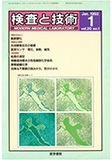Japanese
English
- 有料閲覧
- Abstract 文献概要
C100-3を抗原としたELISA法を用いて4,000検体の血清中の抗C型肝炎ウイルス抗体を測定した.輸血後に非A非B型肝炎となった患者108名の38.9%がHCV抗体を有した.原因不明の慢性肝障害患者316名中30.4%が抗HCV抗体陽性であり,さらにトランスアミナーゼが一過性にまたは慢性的に上昇した2,506名の患者の14.8%にHCV抗体が認められた.26名中65.4%が抗HCV抗体陽性であった血友病患者と46名中56.5%が抗HCV抗体陽性であった薬物中毒者は,ハイリスク群の中でも最も高い浸透率を示した.薬物濫用で瀕死の患者216名とHIV陽性者127名において,それぞれ抗HCV陽性者が37.5%と26.0%であった.透析患者331名中HCVに対する抗体を有するものが12.4%であった.医療関連従事者の間では抗HCV抗体陽性率がわずか2.8%にすぎず,比較的リスクが低いように思われる.今までのところでわれわれが調べた46症例においては,HCVの家族間感染は一例も発見することができなかった.したがって,汚染体液ないし血液によるHCVの感染力はB型肝炎ウイルスやヒト免疫不全ウイルスタイプⅠのキャリアのそれらよりは低いものとわれわれは考えている.
4000 sera were tested for antibodies against hepatitis C virus (HCV) by means of an ELISA using the C100-3 antigen. 38.9% of patients with non-A, non-B hepatitis following blood transfusion (n=108) had HCV antibodies. Among patients with chronic liver damage of unknown origin (n=316) 30.4% were anti-HCV positive, and in 2,506 patients with transitional or chronic elevation of transaminases 14.8% showed HCV antibodies. Haemophiliacs (n=26) with 65.4% anti-HCV positives and drug addicts (n=46) with 56.5 % anti-HCV positives had the highest prevalence among high risk groups. Addictsdying from drug abuse (n=216) and HIV 1 positives (n=127) wereanti-HCV positive in 37.5% and 26.0%, respectively. Patients onhaemodialysis (n=331) had antibodies against HCV in 12.4%. Healthcare workers (n=217) appear to be at a comparably low risk withonly 2.8% anti-HCV positives. Up to now we could not find a singlecase of intrafamilial spread of HCV in 46 examined cases. Wesuggest that HCV infectivity of contaminated body fluids and blood islower than that of hepatitis B virus or human immunodeficiency virustype 1 carriers.
Copyright © 1992, Igaku-Shoin Ltd. All rights reserved.


